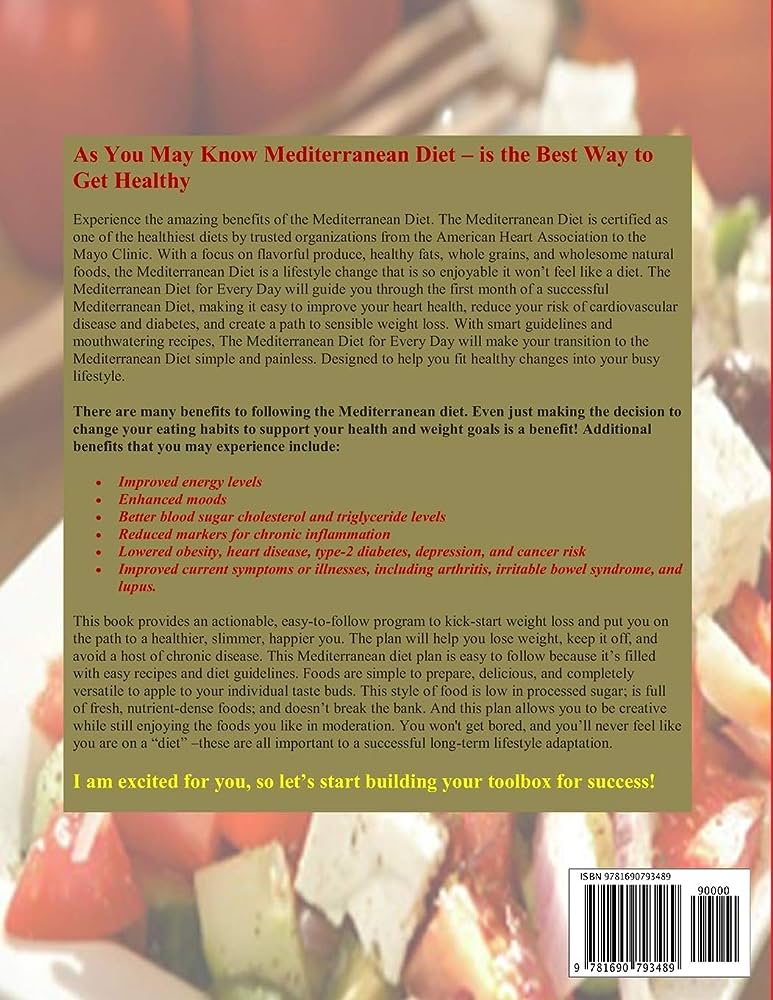
The mediterranean diet is an ideal choice for maintaining heart health, promoting overall well-being. It offers a balanced intake of whole foods, emphasizing fruits, vegetables, whole grains, lean proteins, and healthy fats, while minimizing processed foods, sugary treats, and saturated fats.
This dietary approach has been widely recognized for its numerous health benefits, including reducing the risk of heart disease, lowering blood pressure, improving cholesterol levels, and enhancing weight management. With its focus on nutrient-dense, heart-healthy foods, the mediterranean diet provides a practical and enjoyable way to support heart health and long-term wellness.

Credit: www.prevention.com
Reduced Risk Of Heart Disease
The mediterranean diet is known for its ability to reduce the risk of heart disease. It has been shown to lower ldl cholesterol levels, which is a major contributor to heart-related problems. Additionally, this diet has been linked to reduced blood pressure, which is another risk factor for heart disease.
The mediterranean diet also helps improve blood sugar control, benefiting those with diabetes. By incorporating a variety of fruits, vegetables, whole grains, lean proteins, and healthy fats, this diet provides the necessary nutrients for optimal heart health. Choosing olive oil instead of butter, and opting for fish instead of red meat, are simple yet effective ways to follow this heart-healthy eating pattern.
Overall, the mediterranean diet offers a holistic approach to heart health, promoting longevity and well-being.
Anti-Inflammatory Effects
The mediterranean diet has been widely recognized for its anti-inflammatory effects, which play a crucial role in maintaining heart health. Studies have shown that following this diet can provide protection against chronic inflammation, a key factor in the development of heart disease.
By consuming a variety of fruits, vegetables, whole grains, legumes, and healthy fats, the mediterranean diet helps reduce oxidative stress, a process that occurs when there is an imbalance between free radicals and antioxidants in the body. This reduction in oxidative stress contributes to the overall anti-inflammatory effects of the diet, keeping the heart healthy and reducing the risk of cardiovascular diseases.
Incorporating the mediterranean diet into your lifestyle can be a simple yet effective way to support heart health and promote overall well-being.
Weight Management
The mediterranean diet has been recognized for its effectiveness in weight management. Following this diet allows for sustainable weight loss as well as long-term weight maintenance. Emphasizing the consumption of fruits, vegetables, whole grains, lean proteins, and healthy fats, this diet provides a balanced approach to managing weight.
By avoiding processed foods and sugars often found in western diets, individuals can achieve gradual, yet steady weight loss. Additionally, the mediterranean diet promotes regular physical activity, which further aids in weight management. This lifestyle approach not only supports weight loss goals but also improves heart health and reduces the risk of various chronic diseases.
Incorporating the mediterranean diet into your daily routine can lead to lasting weight management success.
Fresh Fruits And Vegetables
Eating a mediterranean diet is beneficial for maintaining a healthy heart. Fresh fruits and vegetables play a central role in this way of eating. They are not only delicious but also high in fiber and antioxidants. This combination helps to improve heart health and reduce the risk of heart disease.
The fiber in fruits and vegetables helps to lower cholesterol levels and maintain a healthy weight. Antioxidants, on the other hand, protect the cells of your heart against damage caused by harmful free radicals. Including a variety of colorful fruits and vegetables in your diet can provide a wide range of health benefits.
So, next time you’re at the grocery store, be sure to load up your cart with plenty of fresh produce to support a heart-healthy mediterranean-style eating plan.
Whole Grains
Whole grains are rich in essential nutrients and fiber, making them a valuable component of the mediterranean diet.
Healthy Fats
The mediterranean diet is known for its emphasis on healthy fats, such as olive oil, nuts, and seeds. Olive oil is a key component of this diet as it is rich in monounsaturated fats, which can help reduce bad cholesterol levels.
Incorporating olive oil into your diet can provide a range of health benefits, including protection against heart disease. Nuts and seeds, on the other hand, are packed with nutrients and are a great source of healthy fats, fiber, and antioxidants.
They can help lower inflammation and improve heart health. Adding a variety of nuts and seeds to your meals and snacks is a simple and tasty way to contribute to a heart-healthy diet. So, embrace the mediterranean diet and its inclusion of healthy fats to promote a healthier heart.
Fish And Seafood
Fish and seafood are excellent sources of omega-3 fatty acids, which are crucial for heart health. These healthy fats can prevent blood clotting, lower blood pressure, and reduce the risk of heart disease. Fatty fish like salmon, mackerel, and sardines are particularly rich in omega-3s.
Including fish in your mediterranean diet can provide you with the necessary nutrients to promote a healthy heart. You can try grilled or baked fish dishes seasoned with herbs and spices for a delicious and heart-healthy meal. Additionally, seafood such as shrimp and oysters also contain omega-3s, making them great choices for a heart-healthy diet.
So, enjoy a variety of fish and seafood in your meals to support your cardiovascular well-being.
Lean Proteins
Lean proteins play a crucial role in a mediterranean diet for heart health. Poultry, such as chicken and turkey, is a fantastic source of lean protein. It contains high-quality proteins that are essential for the body’s overall growth and repair.
Consuming lean poultry regularly can lower the risk of heart disease, as it is low in saturated fat and cholesterol. Additionally, legumes like lentils, chickpeas, and beans are also excellent sources of protein in a mediterranean diet. These plant-based proteins are rich in fiber, vitamins, and minerals, and can help in maintaining a healthy heart.
Including lean proteins like poultry and legumes in your diet is a smart choice for promoting heart health in the long run.
Meal Planning And Preparation
When planning meals for heart health, incorporating mediterranean ingredients can be beneficial. By including foods such as olive oil, whole grains, and plenty of fruits and vegetables, you can ensure a nutritious and heart-healthy diet. These ingredients are rich in antioxidants, healthy fats, and fiber, which can help reduce the risk of heart disease.
Cooking methods and techniques also play a significant role in maintaining the health benefits of the mediterranean diet. Opting for grilling, baking, or steaming rather than frying can lower the consumption of unhealthy fats. By embracing mediterranean ingredients and preparing meals using healthier cooking methods, you can prioritize your heart health and enjoy flavorful and nourishing meals.
Portion Control
The mediterranean diet is known for its heart-healthy benefits. Portion control plays a crucial role in maintaining a balanced diet. It is important to understand serving sizes to ensure you’re getting the right amount of nutrients. Balancing macronutrients, such as carbohydrates, proteins, and fats, is also essential for your overall heart health.
By being conscious of portion sizes and following the mediterranean diet principles, you can promote a healthy heart. This diet focuses on consuming more fruits, vegetables, whole grains, lean proteins, and healthy fats while limiting processed foods and added sugars.
Incorporating this lifestyle into your routine can help reduce the risk of heart disease and promote overall well-being. Embracing the mediterranean diet can lead to long-lasting health benefits for your heart and body.
Enjoying Shared Meals
Enjoying shared meals is a significant aspect of the mediterranean diet. The social aspects of mealtime play a vital role in promoting heart health. Mediterranean dining experience brings people together and fosters a sense of community. Sharing meals with family and friends encourages a slower-paced, relaxed eating experience.
It allows for meaningful conversations and connections with loved ones. This communal style of eating also promotes portion control and moderation. By savoring the flavors and enjoying the company of others, individuals are more likely to listen to their body’s natural hunger and fullness cues.
Moreover, when we eat mindfully and in a positive social environment, we tend to make healthier food choices. Incorporating the mediterranean diet into your lifestyle not only benefits your heart health but also enhances your overall well-being.
Conclusion
The mediterranean diet has been proven to be a powerful tool in promoting heart health. Its emphasis on plant-based foods, like fruits, vegetables, whole grains, and legumes, along with healthy fats from olive oil and nuts, provides a winning combination for cardiovascular wellness.
This diet also includes moderate amounts of fish and poultry, while limiting red meat consumption. The mediterranean diet’s focus on fresh, unprocessed foods, rich in antioxidants, anti-inflammatory compounds, and omega-3 fatty acids, offers numerous benefits for heart health. Studies have shown that following this eating pattern can lower the risk of heart disease, hypertension, high cholesterol, and stroke.
Furthermore, the mediterranean diet has been linked to improved blood sugar control and reduced inflammation, contributing to overall heart health. By adopting the mediterranean diet, you can take an important step towards safeguarding your heart and enjoying a lifetime of wellness.









